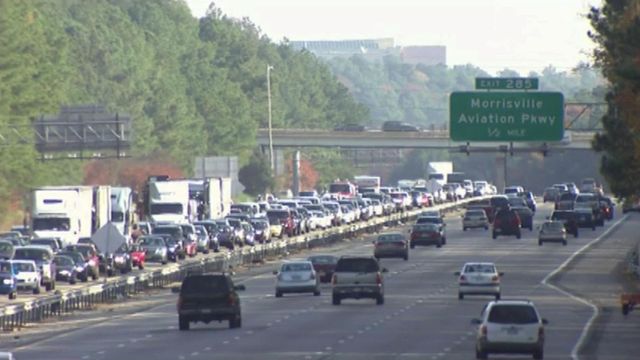Report: Traffic, poor infrastructure cost Triangle drivers $1,000 per year
Triangle drivers pay an extra $1,000 a year each because of poor roads and bridges and traffic congestion, according to a report released Tuesday.
Posted — UpdatedThe report found that 11 percent of North Carolina's major roads and highways are in poor condition and that 30 percent of bridges statewide show significant deterioration or don't meet current design standards. Also, the state’s urban roads are becoming increasingly congested, with drivers wasting significant amounts of time and fuel.
"The next step is to have an open, candid discussion about establishing a sustainable, predictable funding source to make sure we meet our infrastructure needs," said Gary Salamido, vice president of government affairs for the N.C. Chamber.
The traditional funding source for the country's roads and bridges is the gas tax, but the federal tax hasn't increased in more than 20 years, and North Carolina lawmakers have capped the state gas tax at various times.
"At the federal level, we need to be spending about 50 percent more than what we're currently spending," said Will Wilkins, executive director of TRIP.
Additionally, the amount of revenue generated by the gas tax has been on a downward trend for years because of increased vehicle fuel efficiency and the growing number of electric and hybrid vehicles.
North Carolina's growing population will only add to the strain on the state's highway infrastructure, the report's authors said, so new revenue sources are needed.
Area drivers said they don't like the idea of raising the gas tax to generate more money for roads.
"Put a little bit more money in my pocket would be a little better," Derek Burdge said.
"It's high enough as it is, but I think it would help benefit the roads because there's a lot of damaged roads here in Raleigh," Lawrence Ashley said.
Salamido said pushing for a tax increase is a tough sell in an election year, but he and others said North Carolina's economic future depends on maintaining roads and bridges and limiting traffic congestion.
"The time to put policy ahead of politics is now," Salamido said.
"When it comes to transportation, there's an issue called lead time, and so, if you wait until the growth overwhelms you, it's too late," said Joe Milazzo, executive director of the Regional Transportation Alliance, a business group in the Triangle.
The report's authors say the Triangle can learn from Atlanta and northern Virginia in trying to plan to avoid massive traffic congestion.
North Carolina Department of Transportation Chief Deputy Secretary said the report confirms what agency officials have known for some time, adding that he is pleased public attention is being focused on the infrastructure issue.
"We are dealing with an infrastructure system that requires constant maintenance," Tennyson said. "Across the nation and in our state, we see declining transportation revenue projections. At the same time, we are focused on leveraging infrastructure to strengthen the economy and create jobs."
• Credits
Copyright 2024 by Capitol Broadcasting Company. All rights reserved. This material may not be published, broadcast, rewritten or redistributed.





